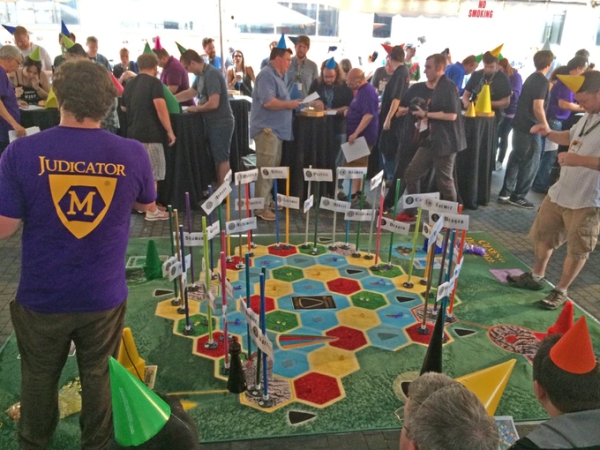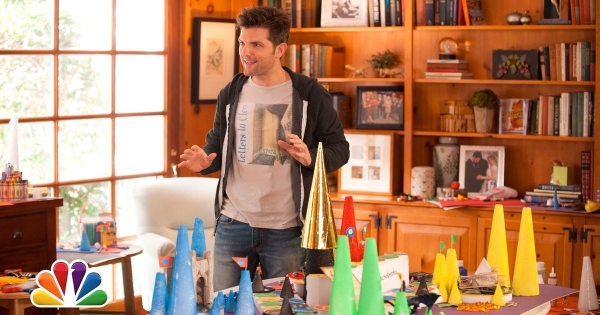
As we reported in January, Mayfair Games, the publisher of Settlers of Catan, took to Kickstarter with the dream of making Cones of Dunshire, a fictional board game from the Parks & Recreation universe, into a real game. Fans of the NBC show and of intricate and/or confusing cooperative board games rejoiced. It seemed like an impossible task to raise $300,000 to create a deluxe version of the game… and it was. So Mayfair canceled their original campaign and relaunched it in early February with some adjustments, including a lowered project goal ($125,000) and reworked pledge levels and rewards.
Even at the reduced levels, it still took at least $400 (and a dream!) to reserve a copy of the game. As before, additional goodies and enhancements to the game were available at higher pledge levels. For example, backers would receive the game at $400, but at $550 they would receive the game with metal “Hero Bases,” and at $700 they would get the game with metal figures.
During the original campaign, pledges were slow to come in and it did not appear that Mayfair would meet its goal in the 60 days allotted. The second Kickstarter, which after a 30-day run ended on March 12th, fared no better. At its conclusion, Mayfair had raised $48,696 from 194 backers, only reaching 39% of its goal.
So how did it all go wrong?
Mayfair’s desire to create a swanky version of the game as a “sprawling riot of pieces” was certainly a major problem. The revamped Kickstarter campaign casually mentioned that if their implausible endeavor was realized, a non-deluxe version of The Cones of Dunshire could potentially be produced for a cheaper price to appeal to a wider audience. Several of the comments that backers made about the ambitious project stated that they would have been happy with a version without all the bells and whistles, and many wondered whether Mayfair should have instead worked on a more realistic, scaled-down option for bringing the game to life so that more people would have an opportunity to enjoy it. If nothing else, making a less expensive and less fancy version would have likely garnered more serious interest from backers, paving the way for a future customer base had the Kickstarter campaign panned out. If you’re going to run a crowdfunding campaign, you should make your pitch to as large a crowd as possible.
But as it happened, there were several commenters, and probably many others, who believed the Kickstarter campaign to be a joke, or at best, a gimmick created to run alongside the final abbreviated season of Parks & Rec to both celebrate its seven fabulous seasons and give it a quirky send off. This was not helped by Mayfair’s continued blurring of the lines of reality and the Parks & Rec universe. To the very end they were thanking the “citizens of Pawnee” for their help, which capped off a sloppy campaign that was supposedly “created” by Tilton and Radomski Accounting, a fictional company that exists within the show. Is it any wonder that people asked if any part of the campaign was real? After all, it’s not like this would be the first hoax to make it onto Kickstarter.

By never breaking character in their pitch (except for a brief mention of the game’s appearance at Gen Con 2014), Mayfair’s Cones of Dunshire campaign felt like it could exist within the universe of Parks & Rec. But it didn’t give those of us in the real world any indication how the game actually worked or if it was even fully playable. For all anybody knew, the Cones of Dunshire game was just meant to be a fancy souvenir. And it’s not like Mayfair was interested in clarifying things as they did not even give a straight answer in the FAQ. When asked point blank if their campaign was a joke, Mayfair replied “Yes and no,” rambled a bit, and then referenced fictional things from the show yet again. It’s no wonder that some people didn’t know what to believe. It was like Joaquin Phoenix’s rap career all over again.
In a final update to the Kickstarter page, Mayfair made a last-ditch effort to defend themselves and their doomed project, but still came off sounding like a stubborn child, irrationally unyielding to other ideas or acknowledging they screwed up. Instead of saying goodnight as the curtain falls, they reaffirmed their stance that producing a smaller edition of Cones of Dunshire would not be “respectful” to the game itself or to the hardcore fans of the show.

The problem all along with some of Mayfair’s rhetoric during this campaign was their insistence that only “true fans” of the show would be interested, and ergo if one did not want to back this absurdly grandiose monstrosity, they were not a true fan and could not understand the utter brilliance of their daring genius. Logistics and economical issues of producing smaller games aside, Mayfair continuously showed a lack of respect for fans and even for the spirit of Adam Scott’s character, Ben Wyatt. They seemingly forgot that Ben cobbled the game together with pieces from other board games found in his house and that the original cones were likely made out of cardboard and spit. Had a reasonably-priced edition of Cones of Dunshire been made available, the thrifty among us could have fashioned our own cones this way, and had some of the fun that Ben had while making it on the show. That’s how you stay true to the spirit of a scrappy show like Parks & Rec.
Allowing more people to obtain copies of the game would have also gone a long way in truly making Cones of Dunshire feel real. And who knows, maybe its success would have eventually lead to the creation of the “punishingly intricate” sequel, The Winds of Tremorrah (which becomes the “ninth-highest selling multiplayer figurine-based strategy fantasy sequel game in history” in the show’s fictional future).
In Mayfair’s quest to birth a larger-than-life Cones of Dunshire, they did it backwards. Had they started with smaller versions, with a promise that deluxe special editions would be made for the Cones enthusiasts if they were successful, more people would have taken them seriously and right now we’d all be fighting over who gets to be The Alchemist. But alas, it was never meant to be. While the project failed to meet its target, disappointed backers of this unrealized goal can find solace in consolation calzones.







